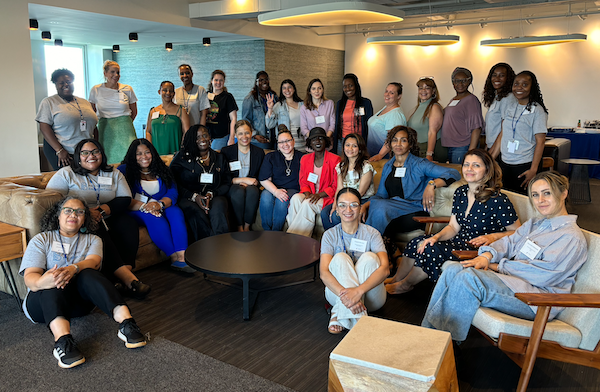This spring marked the culmination of the District 3 (D3) Harlem Racial Equity Math Partnership, a collaboration between the Bank Street Education Center and D3 Harlem Public Schools that aimed to address inequitable instruction for young Black children. Funded by the Carnegie Corporation of New York, the project was designed to increase the percentage of Black students in grades pre-K through second grade who receive high-quality instruction and are on track for success in mathematics by third grade.
Six schools participated in the initiative. These included three 3K-8 schools, A. Philip Randolph (PS 76), Sojourner Truth (PS 149), and Hugo Newman (PS 180), as well as three elementary schools, The Locke School for Arts and Engineering (PS 185), STEM Institute of Manhattan (PS 241), and The Young Diplomats Magnet Academy (PS 242). The partnership leveraged Bank Street’s deep expertise in adult learning and its leadership in social justice, racial equity, and inclusion work to optimize math instruction and ensure all young children reach their full potential.
 Throughout the 2023-24 school year, participants engaged in a series of convenings, cohort meetings, coaching visits, and leadership touchpoints to develop a shared language and understanding of race, equity, and culturally responsive teaching practices linked to math instruction. The project also offered opportunities for parents and families to share insights on their children’s math learning and how their school climates promote equity and inclusivity.
Throughout the 2023-24 school year, participants engaged in a series of convenings, cohort meetings, coaching visits, and leadership touchpoints to develop a shared language and understanding of race, equity, and culturally responsive teaching practices linked to math instruction. The project also offered opportunities for parents and families to share insights on their children’s math learning and how their school climates promote equity and inclusivity.
“Cohort meetings provided an initial collaborative space for teachers to explore how a racial equity lens could inform high-quality, culturally responsive math instruction,” said Rajeeyah Finnie-Meyers, Executive Director, Culture, Race, and Equity, Bank Street Education Center. “Then, during the coaching visits, teachers received targeted support to help them implement new strategies effectively. The leadership touchpoints engaged school and district leaders to ensure that the changes were impactful and sustainable.”
The partnership utilized Bank Street’s Throughline Approach, a framework that prioritizes racial equity and adult learning needs to reimagine instruction. Participants engaged in a continuous improvement cycle, collaboratively identifying the root causes of inequities and developing intervention strategies to apply within the system. The Plan-Do-Study-Act (PDSA) approach also served as a model for this work, which allowed teams to test theories, learn from their experiences, and refine their approach over time.
Participating teachers also regularly collected data throughout the school year to measure and assess the impact on student learning experiences. While teachers reported mixed experiences with the ease of implementing new strategies into their practice, teachers also reported positive changes in student outcomes, including notable improvements in students’ confidence, conceptual understanding, and mathematical thinking.
One educator noted the shift toward consciously discussing race with students by incorporating identity-affirming images and connecting math concepts to African American people, traditions, and achievements. Education Center leaders also observed more discussions among teachers about race during cohort meetings, and shared their vulnerability to support their Black students. These reflections—paired with advances in student learning—underscore the project’s foundational belief: addressing inequitable school systems and structures while ensuring comprehensive learning and change will lead to improved outcomes for all students, particularly Black children.
“Through the efforts of dedicated educators, supportive leaders, and engaged communities, this partnership stands as a model for how systemic change can be achieved in education, fostering an environment where every child has the opportunity to succeed,” said Tracy Fray-Oliver, Vice President, Bank Street Education Center. “We are thrilled to have created a lasting impact on the educational outcomes of young Black students in Harlem.”